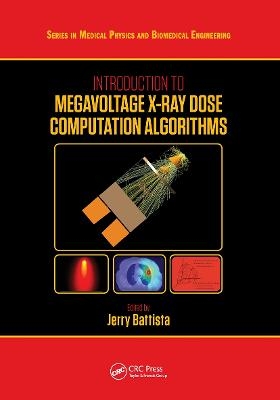
Introduction to Megavoltage X-Ray Dose Computation Algorithms
CRC Press (Verlag)
978-0-367-78051-7 (ISBN)
Read an exclusive interview with Dr. Jerry Battista here.
A critical element of radiation treatment planning for cancer is the accurate prediction and delivery of a tailored radiation dose distribution inside the patient. Megavoltage x-ray beams are aimed at the tumour, while collateral damage to nearby healthy tissue and organs is minimized. The key to optimal treatment therefore lies in adopting a trustworthy three-dimensional (3D) dose computation algorithm, which simulates the passage of both primary and secondary radiation throughout the exposed tissue.
Edited by an award-winning university educator and pioneer in the field of voxel-based radiation dose computation, this book explores the physics and mathematics that underlie algorithms encountered in contemporary radiation oncology. It is an invaluable reference for clinical physicists who commission, develop, or test treatment planning software. This book also covers a core topic in the syllabus for educating graduate students and residents entering the field of clinical physics.
This book starts with a historical perspective gradually building up to the three most important algorithms used for today’s clinical applications. These algorithms can solve the same general radiation transport problem from three vantages: firstly, applying convolution-superposition principles (i.e. Green’s method); secondly, the stochastic simulation of radiation particle interactions with tissue atoms (i.e. the Monte Carlo method); and thirdly, the deterministic solution of the fundamental equations for radiation fields of x-rays and their secondary particles (i.e. the Boltzmann method). It contains clear, original illustrations of key concepts and quantities thoughout, supplemented by metaphors and analogies to facilitate comprehension and retention of knowledge.
Features:
Edited by an authority in the field, enhanced with chapter contributions from physicists with clinical experience in the fields of computational dosimetry and dose optimization
Contains examples of test phantom results and clinical cases, illustrating pitfalls to avoid in clinical applications to radiation oncology
Introduces four-dimensional (4D) dose computation, on-line dose reconstruction, and dose accumulation that accounts for tissue displacements and motion throughout a course of radiation therapy
Dr. Jerry Battista completed his Ph.D. degree at the University of Toronto in 1977 (Compton Tomography). As a post-doctoral resident in medical physics he then gained clinical physics experience at the Princess Margaret Hospital, under the guidance of Dr.“Jack” Cunningham – a pioneer in computerized dose calculations. Jerry moved to the Cross Cancer Institute and University of Alberta in 1979. His team developed one of the first “3D” treatment planning systems and introduced a new breed of ‘convolution/superposition’ algorithms used for planning radiotherapy of cancer patients. Current research interests include 3D dose measurements in gels using optical CT scans, and adaptive dose re-optimization for image-guided radiotherapy. He has published over 120 peer-reviewed articles. Jerry is a Fellow of the Canadian College of Physicists in Medicine (FCCPM), Canadian Organization of Medical Physics (FCOMP) and American Association of Physicists in Medicine (FAAPM). Since 1988, Dr. Battista has been driving Physics Research at the London Regional Cancer Program, in London, Ontario, Canada. He is Professor of Medical Biophysics at Western University, with cross-appointments to the Departments of Oncology, Physics, Diagnostic Imaging and Nuclear Medicine, and the Biomedical Engineering Program. Jerry is an award-winning teacher and he is nationally known for his clear presentations. His enthusiastic style and vivid analogies bring physics concepts to a wide range of audiences with diverse backgrounds, including clinicians, students, and the general public. He has received the university’s top honour for teaching excellence. Dr. Battista has mentored many graduate students, who collectively have received over 20 awards from Canadian, and international, organizations, for excellence in publications or presentations. Jerry was the recipient of the 2017 Gold Medal Award from the Canadian Organization of Medical Physicists (COMP).
Introduction. X-Ray Interactions and Energy Deposition. Conceptual Overview of Algorithms. Convolution and Superposition Methods. Stochastic Radiation Transport Method. Deterministic Radiation Transport Methods. En Route to 4D Dose Computations.
| Erscheinungsdatum | 06.04.2021 |
|---|---|
| Reihe/Serie | Series in Medical Physics and Biomedical Engineering |
| Verlagsort | London |
| Sprache | englisch |
| Maße | 178 x 254 mm |
| Gewicht | 2600 g |
| Themenwelt | Medizin / Pharmazie ► Allgemeines / Lexika |
| Medizin / Pharmazie ► Medizinische Fachgebiete ► Onkologie | |
| Medizin / Pharmazie ► Physiotherapie / Ergotherapie ► Orthopädie | |
| Naturwissenschaften ► Biologie | |
| Naturwissenschaften ► Physik / Astronomie ► Angewandte Physik | |
| Technik ► Medizintechnik | |
| Technik ► Umwelttechnik / Biotechnologie | |
| ISBN-10 | 0-367-78051-8 / 0367780518 |
| ISBN-13 | 978-0-367-78051-7 / 9780367780517 |
| Zustand | Neuware |
| Informationen gemäß Produktsicherheitsverordnung (GPSR) | |
| Haben Sie eine Frage zum Produkt? |
aus dem Bereich


